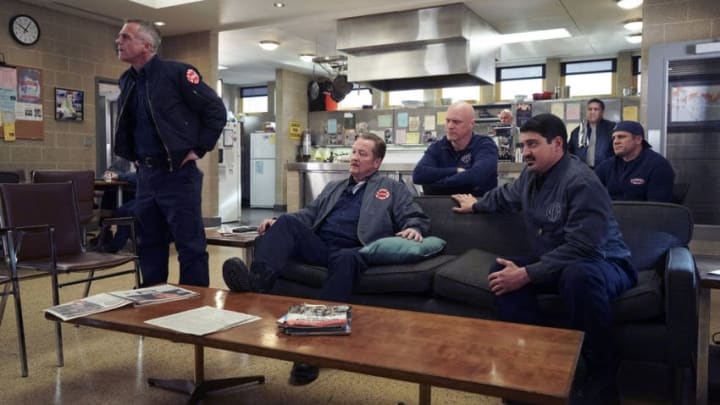
1. What impact will it have creatively?
The biggest and most burning question about NBC’s new One Chicago schedule is whether or not it will have any impact on the actual episodes that we see. We’re not talking about the ratings or the episode count but what you’re actually watching each week.
Fans are about to get hit with plot (and plot-twist) overload. Everything that happens in the One Chicago universe is going to happen in the same span of three hours, so fans are going to have to process it (and will be talking about it) all at the same time. There’s a chance that someone’s brain could explode, and we’re not counting ours since we have to recap all three shows next fall.
The good thing about having some separation between the shows is that we have time to react to what happens and think about it a bit. This past week is a bit of an extreme example because it was the season finales, but could you imagine if we went right from Chicago Fire‘s cliffhanger into learning that Chicago PD had killed off Alvin Olinsky? It might lessen the impact of one if we then have to immediately move on to another.
It’ll also be interesting to see how the One Chicago shows handle the passage of time now that they’re all airing so close together. The series don’t self-reference a lot, but we as fans tend to think of events as happening in real time unless a show specifically mentions a time jump. Like last season when Olinsky’s daughter died, we wondered how he was seemingly okay the next episode because to us, it only felt like a week later.
So how will that work when all the events are happening within hours of each other? The shows don’t consult each other regularly, which might make things unintentionally awkward. Like, say if Will Halstead has another mystery illness on Chicago Med, but that same night’s episode of PD coincidentally features him appearing to help his brother on a case. Or if Chicago Fire blows up the firehouse, but no one on Chicago PD says anything about it.
Our reaction will be to think that’s not right, even as we know that these two episodes were produced independently. The fact that they’re airing together creates a perception of connection. Do the writers acknowledge that at all? Do they even have that ability? What about those rare weeks where the same character crosses over on all three shows? There are ways that this could get weird on-screen, and the only way to really find out is to try it and see what happens.
Next: Here's why Chicago PD killed Alvin Olinsky
What do you think of NBC’s choice to air Chicago Fire, Chicago PD and Chicago Med all on one night next season? Give us your thoughts on these questions, and any questions you have, in the comments.
One Chicago airs Wednesdays on NBC this fall.
